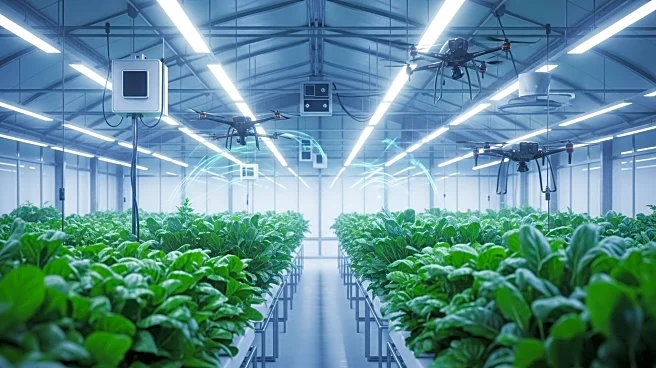What's Happening?
The digital agriculture market is projected to experience substantial growth, with its value expected to rise from USD 23.67 billion in 2025 to USD 47.92 billion by 2032. This growth is anticipated to occur at a compound annual growth rate (CAGR) of 10.6% over the forecast period. The market analysis highlights key players such as Deere & Company, AGCO Corporation, and CNH Industrial, among others. The report provides a comprehensive analysis of current trends, market size, and future projections, combining both qualitative and quantitative insights. It evaluates government policies, market dynamics, cost structures, and the competitive landscape, while also highlighting emerging advancements and future growth potential.
Why It's Important?
The projected growth of the digital agriculture market is significant for several reasons. It indicates a shift towards more technologically advanced farming practices, which can lead to increased efficiency and productivity in the agricultural sector. This growth is likely to benefit major industry players and could lead to increased investment in digital agriculture technologies. Additionally, the expansion of this market may drive innovation and competition, potentially leading to more sustainable and environmentally friendly farming practices. Stakeholders in the agriculture industry, including farmers, technology providers, and policymakers, stand to gain from these advancements as they adapt to changing market dynamics.
What's Next?
As the digital agriculture market continues to grow, stakeholders can expect increased investment in research and development to further enhance technological solutions. Companies may focus on developing new products and services to meet the evolving needs of the agriculture sector. Additionally, there may be increased collaboration between technology providers and agricultural businesses to implement these solutions effectively. Policymakers might also play a role in shaping regulations and policies that support the adoption of digital agriculture technologies, ensuring that the benefits are maximized across the industry.
Beyond the Headlines
The growth of the digital agriculture market could have broader implications for food security and sustainability. By improving efficiency and productivity, digital agriculture technologies can help address challenges related to feeding a growing global population. Furthermore, these technologies may contribute to reducing the environmental impact of farming by optimizing resource use and minimizing waste. As the market evolves, ethical considerations around data privacy and the digital divide in agriculture may also come to the forefront, requiring careful attention from industry leaders and policymakers.








